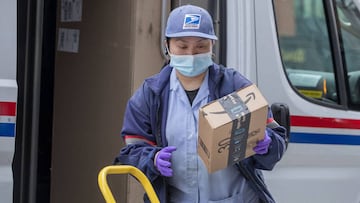Coronavirus USA: what does lockdown mean and what is an essential business
The US is bracing for the worst of the coronavirus curve across the country, but what are the restrictions in place and what services will remain unaffected?

The USA is preparing itself for a tsunami of coronavirus cases as the global pandemic descends on the country, with the administration of President Donald Trump estimating that there will be between 100,000 and 200,000 deaths as a result of the Covid-19 pandemic. Dr. Anthony Fauci and Dr. Deborah Birx, of the White House's Coronavirus Task Force, made the grim forecast during the daily presidential briefing on 31 March, but added that mitigation measures in place have prevented a far larger outbreak in the US, where there are more than 200,000 confirmed cases of Covid-19 and over 4,500 deaths as of 21:00 CEST on April 1.
“As sobering a number as that is, we should be prepared for it,” said Fauci. “It will be difficult, no one is denying that we are going through a really difficult time right now.”
Despite Trump's initial downplaying of the coronavirus epidemic, the US president changed his tune during the same media appearance, stating: “This could be a hell of a bad two weeks. This is going to be a very bad two, and maybe three weeks. This is going to be three weeks like we’ve never seen before [...] This is going to be the roughest three weeks we’ve ever had in this country,”
US states have put lockdown procedures in place and assured the populace that essential services will be maintained, but what does that actually mean for US citizens?
US Lockdown
06:35am in Britain, and already flights from Boston, Chicago, & Dallas, are landing in London — despite US having more #COVID19 cases than any other country in world
— Alex Macheras (@AlexInAir) April 1, 2020
Arriving passengers will enter UK without any checks/measures (never has been any) despite Britain’s “lockdown” pic.twitter.com/WXam3IJxgX
The lockdown is far from complete, with California issuing the first order for citizens to avoid non-essential outdoor activities in mid-March, but major cities and potential hotspots have issued a stay at home order. Chicago, the third-most populated US city, issued an effective lockdown as of Saturday, March 21st at 5pm CT until further notice, while also closing all public facilities.
However, there is no national policy on lockdown as yet, leaving many US citizens free to travel across states, potentially from hotspot areas to ones as yet largely unaffected by Covid-19.
Several states have already ordered businesses, schools, and workplaces to close and enforced social distancing by limiting public gatherings. At least 24 states have directed all residents to stay at home and seven have announced the closure of schools for the remainder of the academic year. The US, though, lacks the power to shut down the entire country through a decree from Washington, with most states operating autonomously. Even the Centers for Disease Control and Prevention (CDC), does not have the authority to enforce a nationwide lockdown.
US essential businesses
The sheriff previously deemed gun stores 'nonessential' and ordered them to shut down. #California #Constitution #Coronavirus #federalgovernment #guncontrol #guns #LosAngeles #SecondAmendment #USNews https://t.co/PNqG6vkgRO
— The Western Journal (@WestJournalism) March 31, 2020
In line with most European countries, supermarkets and those businesses deemed essential (including pharmacies) will remain open during state-wide lockdowns. In many areas, citizens will be permitted to go shop for food, see their doctor or simply take some daily exercise in parks or open spaces.
Florida and Nevada became the latest states to adopt measures on 1 April, according to the NYT, but others, such as Arkansas, Iowa, Nebraska, North Dakota, and South Dakota, have yet to take any action to prevent free movement of their citizens.
According to the same source, there are currently some 283 million people in the US and Puerto Rico under some manner of lockdown situation.
